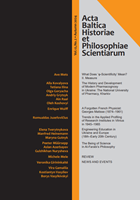The Being of Science in Al-Farabi’s Philosophy
The Being of Science in Al-Farabi’s Philosophy
Author(s): Peeter Müürsepp, Aslan Azerbayev, Gulzhikhan NuryshevaSubject(s): Epistemology, History of ideas, Philosophy of Middle Ages, Middle-East Philosophy, Philosophy of Science, 6th to 12th Centuries
Published by: Tallinna Tehnikaülikooli õiguse instituut
Keywords: education; enlightenment; morality; rationality; science; worldview;
Summary/Abstract: The purpose of the article is to identify the forms of being of science in the philosophy of the Muslim thinker Abū Naṣr Muhammad al-Fārābī, who lived in the 9th–10th centuries. In this regard, the article first addresses the problem of the origin of science. The enumeration of sciences is manifested in al-Farabi’s research as “divine science,” that is, metaphysics and individual sciences, with a Muslim specificity. Science as a process of cognition is an ascent from the imperfect to the perfect. The First Cause (the First Being) of everything is the absolute perfection. It is also a deity and the “cause” of the origin of sciences. The comprehensive encyclopedism of al-Farabi’s predetermined science is a kind of worldview. In this context, he distinguished between the science of language, logic, mathematics, physics, metaphysics, and civil science, which explains the essence of real happiness. Only members of the ideal community (“the inhabitants of a virtuous city”) are able to achieve happiness. Therefore, the study of sciences in totality creates the respective “virtuous” worldview. Science as a cognitive activity forms an intellectual and moral category of “elites” whose mission is enlightenment. Morality is the foundation of intelligence. Thus, the problem of being of science in al-Farabi’s philosophy is undeniably relevant in the framework of Enlightenment 2.0.
Journal: Acta Baltica Historiae et Philosophiae Scientiarum
- Issue Year: 12/2024
- Issue No: 2
- Page Range: 135-150
- Page Count: 16
- Language: English

